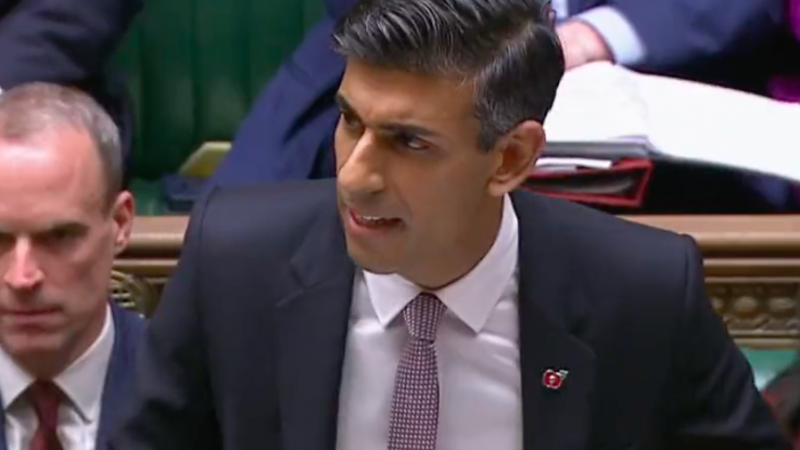The full might of the state is being used to discipline and cheapen labour

Prem Sikka is an Emeritus Professor of Accounting at the University of Essex and the University of Sheffield, a Labour member of the House of Lords, and Contributing Editor at Left Foot Forward.
In folklore, elected governments are expected to increase people’s prosperity and happiness, improve their living standards and protect the vulnerable. But that is not the case in the UK where the government has declared war on employees and is using the state apparatus to deprive workers of their rights.
Living standards of the masses are seriously eroded by an inflation rate of over 14%, the highest for 40 years. Much of the inflation is driven by corporate profiteering, especially by energy companies whose profits have more than doubled. In October 2021, the average annual household energy bill was £1,277, compared to £2,500 now, and is set to rise to £3,000 in April. Food prices are rising at the rate of 13.3%.
Against soaring inflation and a deepening cost-of-living crisis, private sector workers have secured an average pay rise of 6.6%, whilst public sector workers’ pay has increased by just 2.2%. The average real pay of workers is less than what it was in 2008. Millions of people, including teachers, nurses and police are relying upon food banks and charity to see them through hard times. Some 16.65 million people are living in poverty. Over 800,000 children are going hungry. Low income condemns people to poor housing, food and healthcare, and the National Health Service can’t cope with demand. In the world’s sixth largest economy, around 500 people a week are dying because of delays in providing emergency care.
Nurses, doctors, postal, rail, telecommunications, port and other workers are taking industrial action to secure higher pay rises, but Prime Minster Rishi Sunak opposes higher pay for public sector workers with claims that this “will fuel inflation”. No evidence has been provided to support such assertions, especially as inflation is driven by profiteering rather than excessive wages.
To prevent workers from securing higher pay, the government is rushing out legislation which would make it very difficult, if not impossible, for workers to take industrial action. The Bill would force striking workers in the health, education, fire, ambulance, rail and nuclear commissioning sectors to provide a minimum level of service during strikes. Failure to do so would result in workers losing jobs and unions being sued for damages. This is in addition to the Conduct of Employment Agencies and Employment Businesses (Amendment) Regulations 2022, which enables employers to fire workers and replace them with cheaper agency staff.
The proposed law violates the UK’s commitments under Article 11 of the European Convention on Human Rights. Under this, workers will effectively be conscripted. They will be required to work anti-social hours and weekends as refusal would constitute failure to provide ‘minimum service’. Some crucial workers, such as railways signalling staff, would find it difficult to go on strike as their absence would result in the companies not being able to run a minimum service. The inability to withdraw labour would condemn workers to low wages and poor working conditions, whilst boosting corporate profits.
In stark contrast, there are no restraints on pay at the top-end of the scale. High Pay Centre data shows that the median annual pay of FTSE100 CEOs has hit £3.41m. This is 39% more than the median CEO pay as of January 2022. A typical FTSE100 CEO’s pay is103 times more than the median full-time workers’ pay of £33,000 i.e. it takes the CEO less than 4 days to surpass the wage of an average worker.
Employees and customers have no say in executive pay. No Minister or leading politician has called CEO pay to be inflationary. There are no calls for curbs even though excessive executive pay fuels inequalities which deprive millions of access to good food, housing, education, healthcare, pensions and an ability to influence government policies through lobbying.
Successive governments have been content for corporate remuneration committees consisting of non-executive directors to oversee and curb undeserved executive pay. In reality, non-execs are friends and stooges of executive directors and rarely bite the hand that feeds them. All too often they are directors of other companies and are loathe to establish lower benchmarks, which in turn will mean lower remuneration for them. There is little or no relationship between executive pay and corporate performance.
Shareholder votes on executive pay are in general advisory rather than binding. To prevent the development of effective statutory sanctions, the Investment Association on behalf of the corporate sector operates a public register which names companies where 20% or more of shareholders vote against executive pay at annual general meetings. However, ‘naming and shaming’ has not prevented corporate elites from helping themselves. Recently, 44% of the shareholders of Kier voted against the company’s remuneration report, but directors still collected their pay packet.
The government has declared war on workers, camouflaged by utterances about controlling inflation. The full might of the state is being used to discipline and cheapen labour. No doubt, the government hopes that the resulting insecurity will produce docile and compliant workers. Such policies are a recipe for social squalor and unrest. They cannot revive the economy as without good purchasing power people cannot buy goods and services.
Left Foot Forward doesn't have the backing of big business or billionaires. We rely on the kind and generous support of ordinary people like you.
You can support hard-hitting journalism that holds the right to account, provides a forum for debate among progressives, and covers the stories the rest of the media ignore. Donate today.



